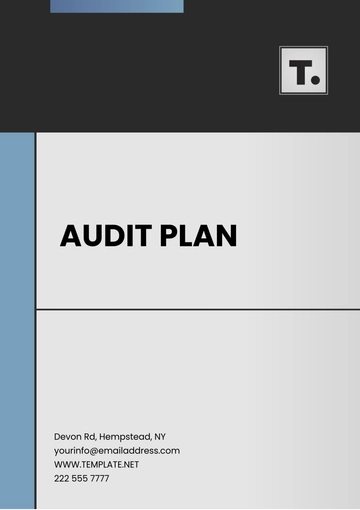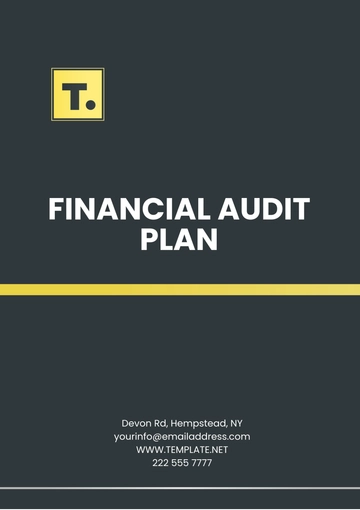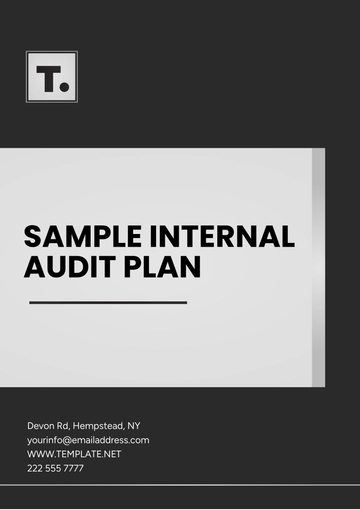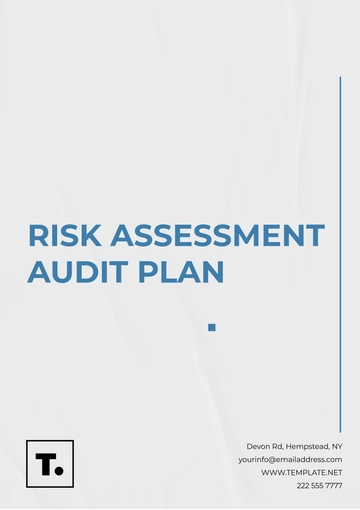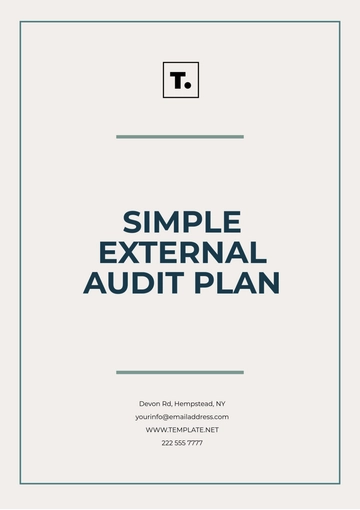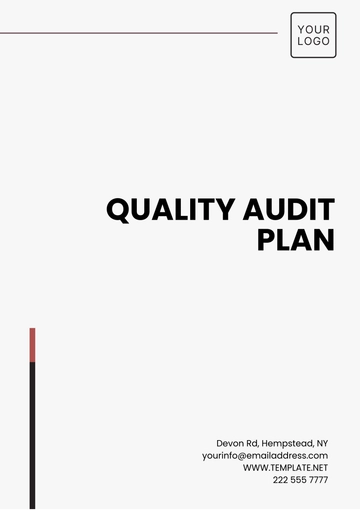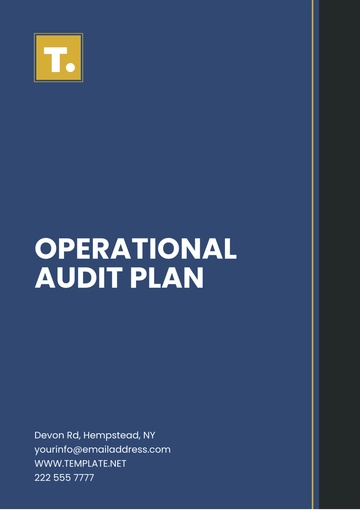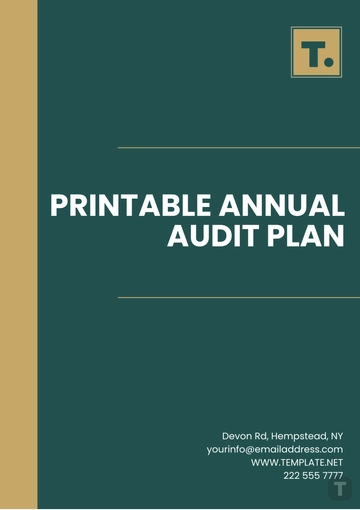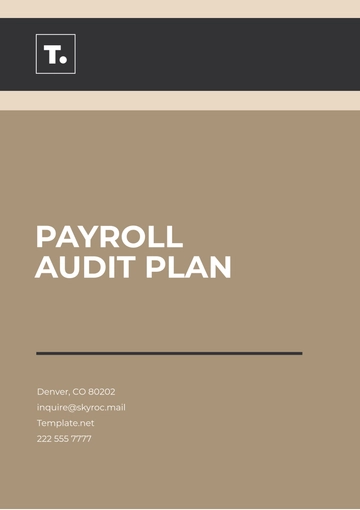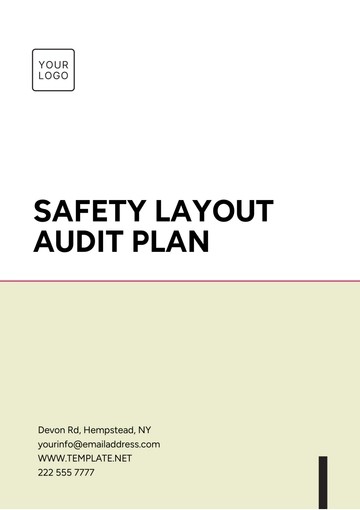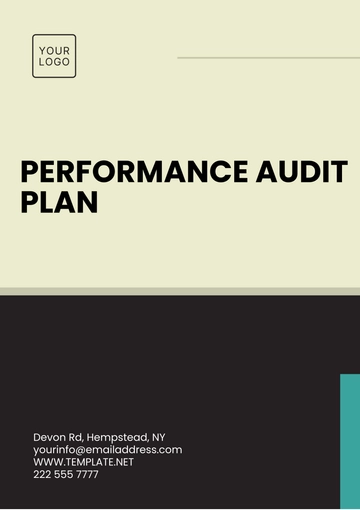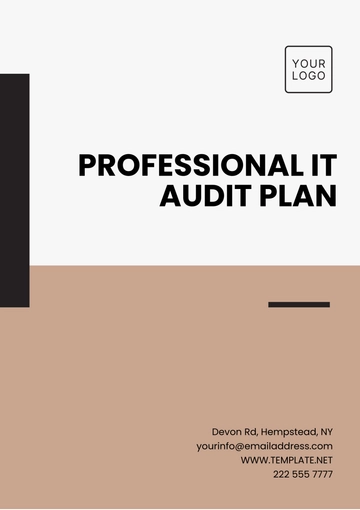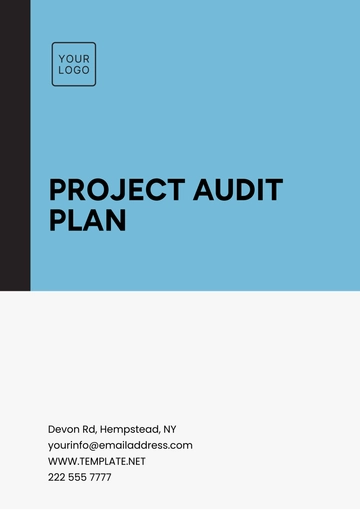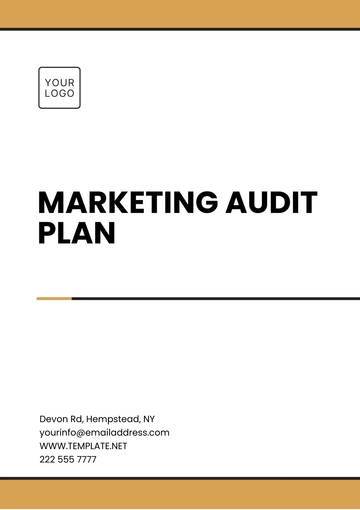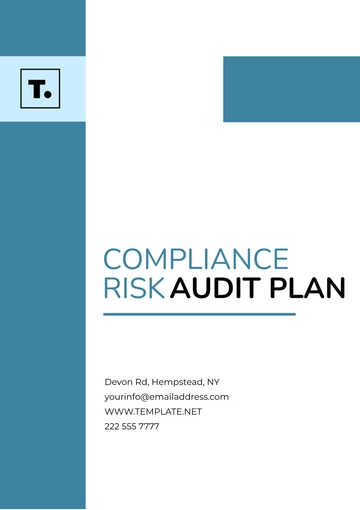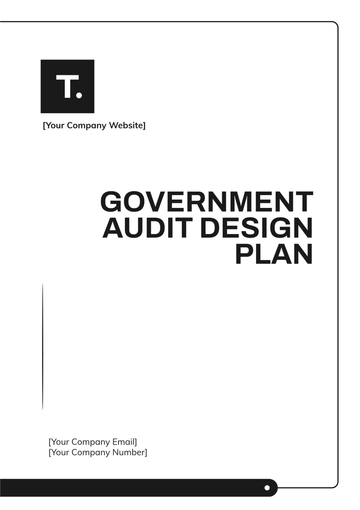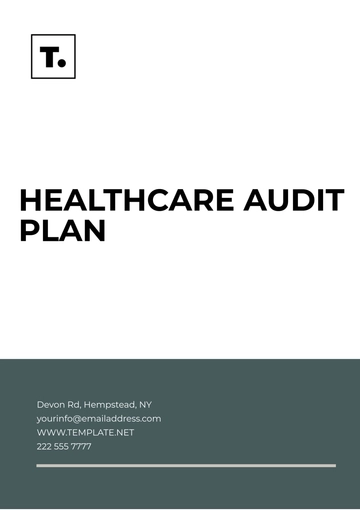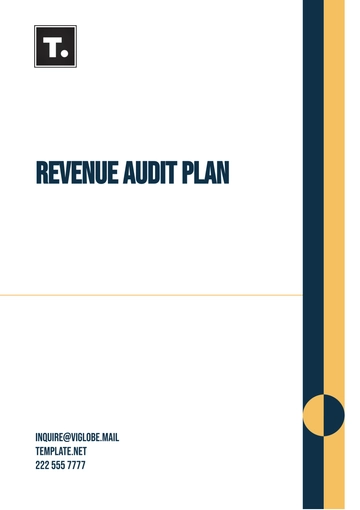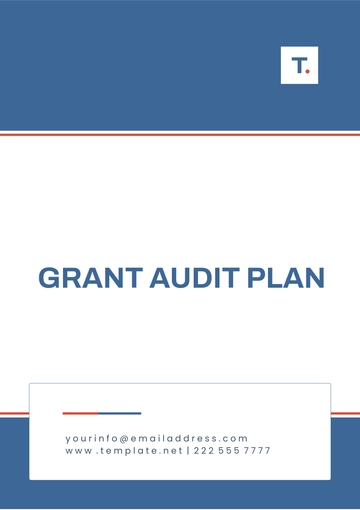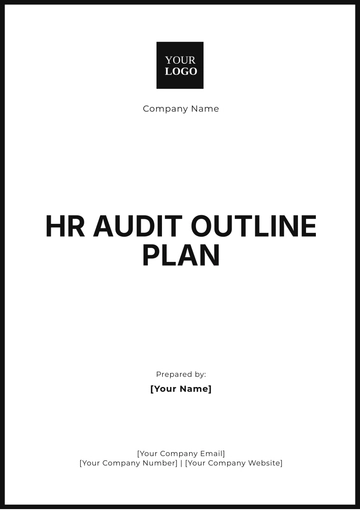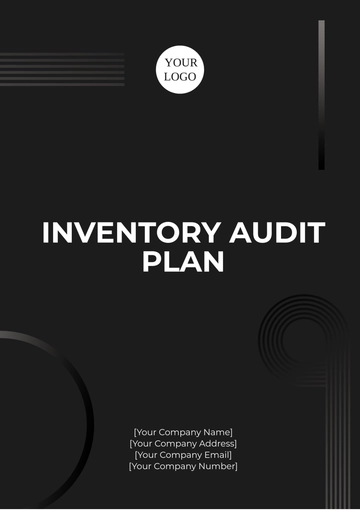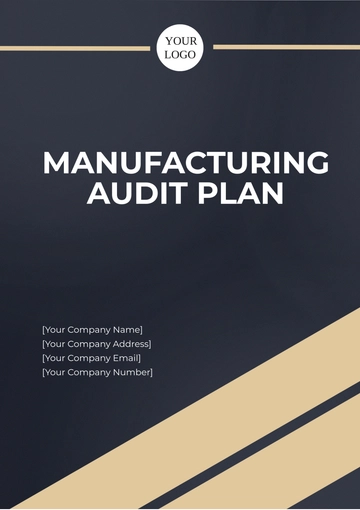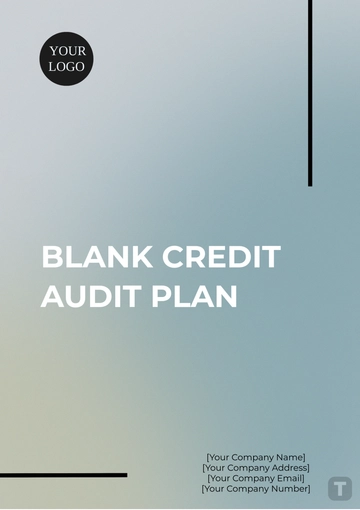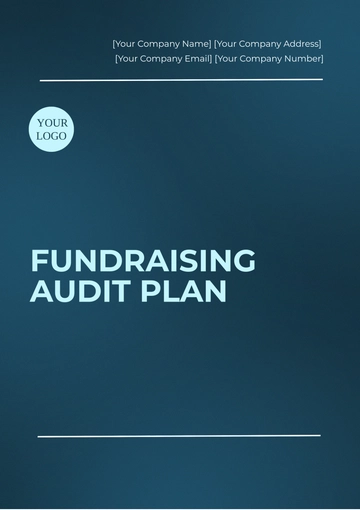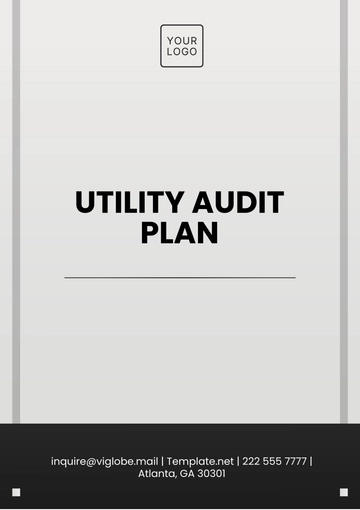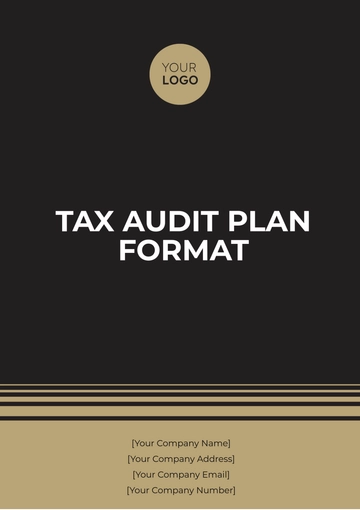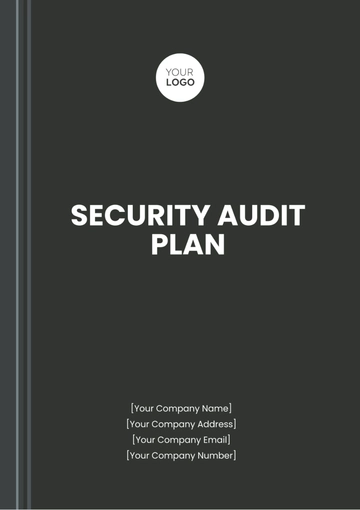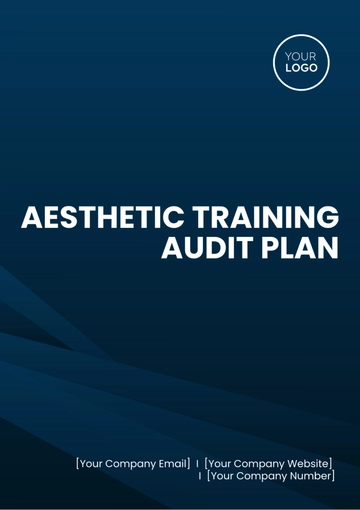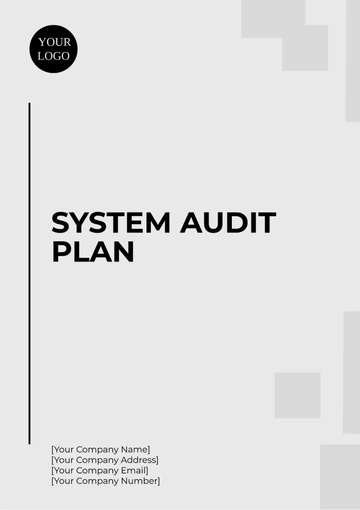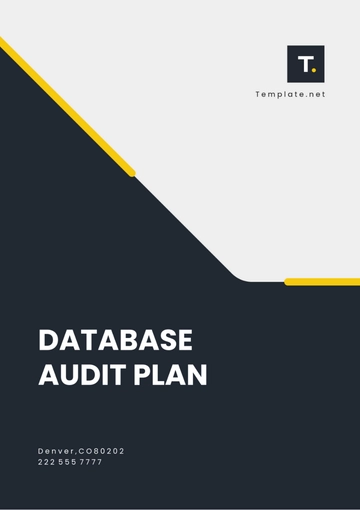Free Hotel Audit Plan
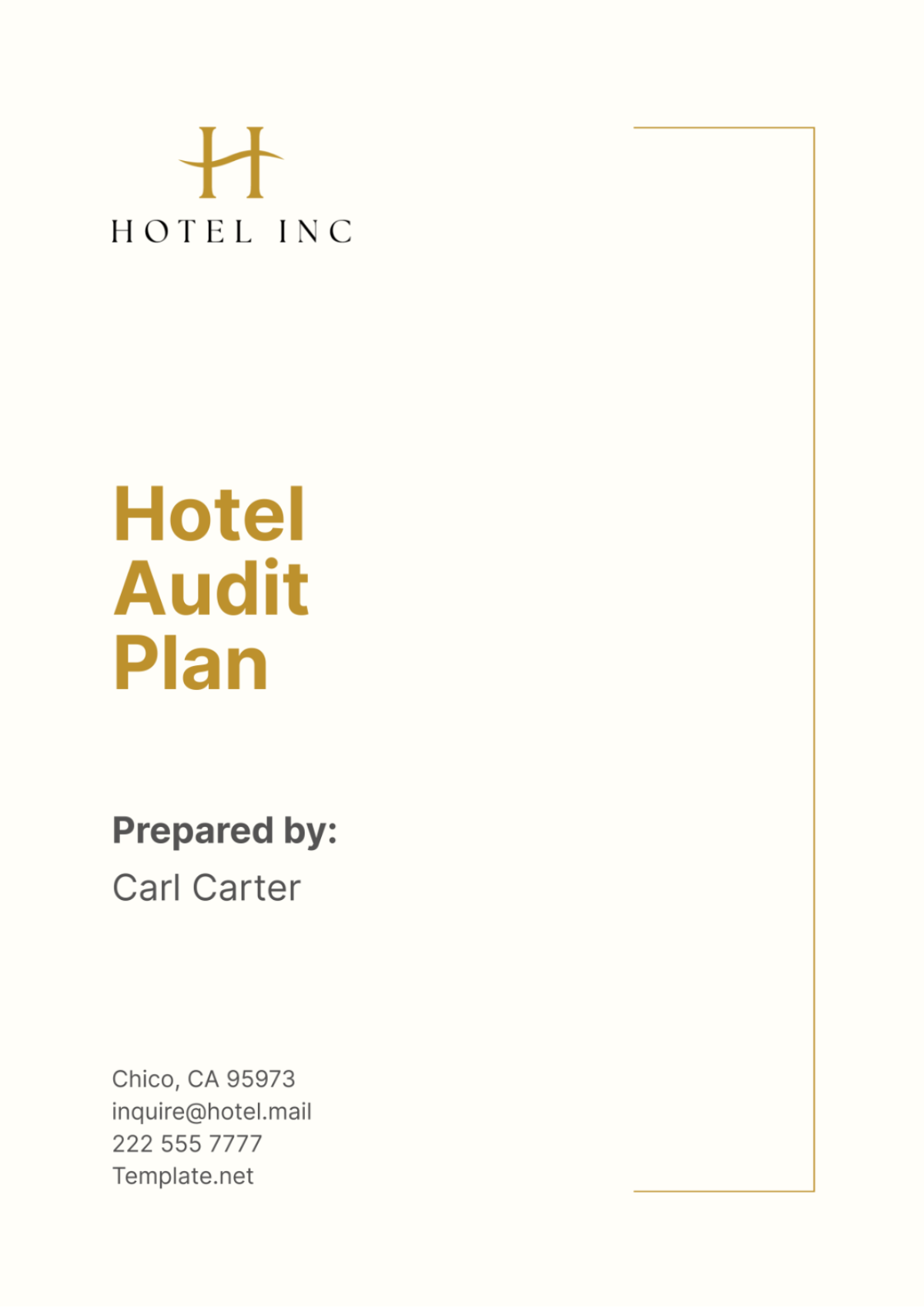
I. Introduction
The Hotel Audit Plan serves as an essential tool for [Your Company Name] to maintain and bolster its financial fortitude and operational effectiveness. Designed with precision, the audit aims to uphold stringent compliance with financial regulations and uncover potential areas for cost reduction, ultimately driving increased profitability. This systematic approach ensures that every financial activity aligns with our corporate goals and legal obligations, setting a robust foundation for sustained economic success.
Our methodology is meticulous, focusing on critical areas such as revenue management strategies and the integrity of expenditure records. Through a detailed examination of these elements, we aim to pinpoint discrepancies and inefficiencies that may impact our bottom line. The audit extends to verifying the accuracy of asset valuations, a crucial step in ensuring the reliability of our financial statements and supporting the strategic decision-making process across the hotel’s operations.
The end goal of our Hotel Audit Plan is to provide comprehensive insights that inform strategic initiatives and foster operational improvements. By implementing this plan, [Your Company Name] will be able to enhance resource allocation, optimize financial performance, and maintain a competitive edge in the hospitality industry. Our commitment to transparency and accountability is paramount, as these principles guide our efforts to achieve excellence in all aspects of our operations.
II. Objectives
The Hotel Audit Plan aims to accomplish several key objectives that are critical to the sustainable growth of [Your Company Name]. These include:
Ensuring Compliance with Financial Regulations and Standards: The foremost objective of our Hotel Audit Plan is to ensure that [Your Company Name] adheres strictly to all applicable financial regulations and standards. This involves conducting a rigorous evaluation of our financial reporting systems, accounting practices, and compliance protocols. By closely monitoring these areas, we aim to prevent regulatory infractions that could result in penalties or damage our reputation. This systematic scrutiny helps maintain the integrity of our financial operations and fosters trust among our stakeholders and investors.
Identifying Areas for Cost Optimization to Enhance Overall Profitability: A key focus of the audit is to identify potential areas within our operations where costs can be reduced without compromising service quality. This includes reviewing supplier contracts, energy usage, staffing efficiencies, and unnecessary expenditures. By pinpointing these areas, we can implement strategic changes that reduce operational costs and improve our profit margins. This process not only supports financial health but also drives our commitment to resourceful and sustainable business practices.
Enhancing the Effectiveness of Internal Controls and Risk Management Practices: Our audit plan also prioritizes the enhancement of internal controls and risk management practices. Effective controls are crucial for safeguarding assets, preventing fraud, and ensuring the accuracy of financial records. We assess the robustness of our existing controls and identify any gaps in procedures that could lead to financial or operational risks. This objective is vital for minimizing vulnerabilities within our hotel operations and ensuring a secure, well-managed establishment.
Verifying the Accuracy and Compliance of Payroll Processes with Employment Laws: Ensuring that our payroll processes are accurate and compliant with all employment laws is another critical objective of the Hotel Audit Plan. This includes verifying that wages are calculated correctly, benefits are distributed fairly, and all tax obligations are met. Regular audits of our payroll system help prevent legal issues related to employment practices and ensure that our team members are treated fairly and with respect. This not only supports compliance but also enhances employee satisfaction and retention.
III. Scope
The scope of the audit will cover all aspects of [Your Company Name]'s hotel operations. This includes but is not limited to:
Reviewing Revenue Management Strategies: The audit will comprehensively assess the revenue management strategies currently employed by [Your Company Name]. This includes evaluating pricing models, occupancy rates, and revenue streams from different services such as room bookings, events, and dining facilities. Our objective is to determine the efficacy of these strategies in maximizing revenue potential and adjusting them according to market trends and guest preferences. This review helps us optimize our pricing and promotional efforts to enhance revenue generation.
Examining Expenditure Records and Budgets: A thorough examination of our expenditure records and budget allocations forms a significant part of the audit scope. By scrutinizing these financial documents, we aim to ensure that spending is aligned with our strategic goals and financial forecasts. This evaluation helps identify any variances between budgeted and actual expenditures, pinpointing areas where financial management can be improved to prevent overspending and ensure financial discipline.
Verifying Asset Values and Their Proper Documentation: Verifying the accuracy of our asset values and ensuring that all assets are properly documented are essential to maintain the integrity of our financial statements. The audit will involve physical verification of assets and examination of related documentation such as purchase receipts, depreciation schedules, and maintenance records. This process safeguards against asset mismanagement and contributes to accurate financial reporting.
Evaluating the Effectiveness of Internal Controls: The effectiveness of internal controls within hotel operations will be critically evaluated to ensure they are robust enough to protect assets, ensure reliable financial reporting, and comply with relevant laws and regulations. This includes reviewing processes related to cash handling, inventory management, and data security. Strengthening these controls helps minimize risk and enhances operational efficiency.
Conducting a Detailed Analysis of Payroll Processes: A detailed analysis of payroll processes will be conducted to verify that all compensation practices are in accordance with labor laws and company policies. This includes ensuring the accuracy of wage calculations, compliance with overtime rules, and proper handling of payroll taxes. This audit component is crucial for maintaining legal compliance and fostering a fair work environment, which is fundamental for employee satisfaction and retention.
IV. Methodology
The audit will be conducted using a structured methodology to ensure thoroughness and accuracy. The process is demonstrated in the following table:
Stage | Description | Details |
|---|---|---|
Initial Planning | This stage involves defining the audit's scope, objectives, and criteria. It sets the groundwork for a focused and effective audit. | Scope Definition: Precisely outline the areas of operations to be audited. |
Objective Setting: Establish what the audit aims to achieve. | ||
Criteria Establishment: Set benchmarks for evaluation. | ||
Data Collection | Gathering all necessary financial records, asset documentation, and payroll information is critical for a thorough audit. | Financial Records: Collect statements, receipts, and ledgers. |
Asset Documentation: Gather asset registers, purchase documents, and depreciation schedules. | ||
Payroll Information: Acquire payroll sheets, tax filings, and compliance records. | ||
Data Analysis | This phase involves analyzing the collected data to identify trends, anomalies, and potential areas for improvement. | Trend Analysis: Evaluate financial trends over time. |
Anomaly Detection: Identify discrepancies and outliers. | ||
Improvement Areas: Pinpoint areas needing efficiency or compliance enhancements. | ||
Reporting | Compiling the audit findings into a comprehensive report with actionable recommendations. This report serves as the basis for decision-making and strategic planning. | Drafting Report: Create a detailed report outlining findings. |
Actionable Recommendations: Provide specific suggestions for improvement. | ||
Strategic Insights: Offer insights for future planning. | ||
Review and Follow-up | This final stage ensures that the recommended actions are implemented and assesses their effectiveness. It is crucial for the audit cycle's completion and ongoing improvement. | Implementation Monitoring: Track the application of recommended actions. |
Effectiveness Assessment: Evaluate the outcomes of the implemented changes. | ||
Continuous Improvement: Recommend further adjustments as needed. |
This table reflects a structured, systematic approach, ensuring that each stage of the Hotel Audit Plan is well-detailed and contributes to the ongoing enhancement of [Your Company Name]'s operations.
V. Review of Revenue Management Strategies
The assessment of revenue management strategies forms a crucial part of our Hotel Audit Plan. By evaluating current pricing strategies, occupancy rates, and revenue per available room (RevPAR), this analysis aims to uncover opportunities for enhancing revenue streams and overall financial performance. This section will delve into the effectiveness of our existing pricing models and identify discrepancies in revenue collection, providing strategic insights to optimize profitability.
Aspect to Review | Description | Evaluation Criteria | Expected Outcomes |
|---|---|---|---|
Pricing Strategies | Analysis of current room pricing, discount offerings, and special rates. |
| Optimize pricing to maximize revenue without deterring potential guests. |
Occupancy Rates | Examination of room occupancy levels across different seasons and market segments. |
| Implement strategies to improve occupancy rates during off-peak times. |
Revenue per Available Room (RevPAR) | Assessing RevPAR to measure the amount of revenue generated per room. |
| Enhance room rate strategies to increase overall RevPAR. |
Revenue Collection | Scrutiny of the processes for collecting payments, managing reservations, and handling cancellations and no-shows. |
| Streamline processes to reduce revenue losses and improve collection efficiency. |
This comprehensive review is designed to ensure that [Your Company Name] leverages its revenue management strategies effectively, optimizing each aspect to contribute positively to our financial growth and sustainability. Through meticulous analysis and strategic adjustments, we aim to enhance profitability and ensure competitive advantage in the hospitality market.
VI. Examination of Expenditure Records
A meticulous examination of expenditure records is a pivotal component of our Hotel Audit Plan. This process involves reviewing all financial transactions, operational expenses, and capital expenditures to ensure they are documented, justified, and aligned with our financial goals. By identifying discrepancies and unnecessary expenses, we aim to uncover opportunities for significant cost savings and enhance fiscal responsibility.
Aspect to Review | Description | Evaluation Criteria | Expected Outcomes |
|---|---|---|---|
Financial Transactions | Review of all monetary transactions including payments, refunds, and adjustments. |
| Ensure all transactions are legitimate and enhance financial transparency. |
Operational Expenses | Scrutiny of ongoing costs related to the hotel's daily operations, such as utilities, staffing, and maintenance. |
| Identify inefficiencies and implement measures to reduce operational costs. |
Capital Expenditures | Examination of spending on assets that provide long-term benefits, such as renovations or new equipment. |
| Optimize capital spending to ensure it contributes to sustainable growth. |
Documentation and Justification | Review the documentation supporting each expenditure and the justifications for these costs. |
| Streamline expenditure processes and prevent financial waste. |
This thorough examination not only aims to validate the legitimacy and necessity of every expense but also seeks to align our spending with the broader financial objectives of [Your Company Name]. By critically assessing each category of expenditure, we enhance our financial stewardship and position our hotel for sustainable success.
VII. Verification of Asset Values
Ensuring the accuracy of asset values is crucial for maintaining the financial integrity of [Your Company Name]. This segment of the Hotel Audit Plan focuses on assessing both physical and intangible assets to confirm their current valuation and proper documentation. By accurately recording these values, we can make more informed decisions regarding asset utilization, investment, and potential liquidation.
Aspect to Review | Description | Evaluation Criteria | Expected Outcomes |
|---|---|---|---|
Physical Assets | Assessment of tangible assets such as property, equipment, and furnishings. |
| Ensure physical assets are valued correctly and reflect their current state. |
Intangible Assets | Evaluation of intangible assets like brand value, licenses, and intellectual property. |
| Accurately represent intangible assets in financial statements. |
Documentation Verification | Review of all documentation related to asset purchases, maintenance, and valuation adjustments. |
| Guarantee all asset-related documentation is up-to-date and compliant. |
Utilization and Liquidation | Examine the current use of assets to determine their efficiency and potential for sale or repurposing. |
| Optimize asset utilization and make strategic decisions about liquidation. |
This comprehensive verification process is designed to reinforce the financial foundation of our hotel, providing a clear and accurate portrayal of our asset values. This enables strategic decision-making that aligns with our long-term goals, ensuring sustainable financial health and operational efficiency.
VIII. Evaluation of Internal Controls and Risk Management
The evaluation of internal controls and risk management practices is indispensable for protecting [Your Company Name]'s assets and optimizing operational efficiency. This critical aspect of our Hotel Audit Plan aims to scrutinize the existing mechanisms and strategies to identify potential weaknesses or gaps. By addressing these issues, we aim to bolster our defenses against risks and improve the overall effectiveness of our operations.
Aspect to Review | Description | Evaluation Criteria | Expected Outcomes |
|---|---|---|---|
Current Internal Controls | Examination of the systems and processes in place to prevent fraud, errors, and ensure financial accuracy. |
| Strengthen controls to ensure tighter security and accuracy of operations. |
Risk Management Strategies | Review of the strategies employed to identify, manage, and mitigate operational and financial risks. |
| Enhance risk management practices to preemptively address potential threats. |
Control Weaknesses and Gaps | Identification of deficiencies in the current internal control framework. |
| Recommend robust improvements to fortify weak areas in the control system. |
Recommendations for Improvement | Development of actionable recommendations to improve internal controls and risk management. |
| Implement strategic improvements to elevate operational security and efficiency. |
This evaluation not only safeguards the hotel's assets but also ensures that the operational procedures are efficient and secure. By meticulously assessing and refining our internal controls and risk management strategies, [Your Company Name] is better prepared to face challenges, thereby supporting sustainable business growth and stability.
IX. Analysis of Payroll Processes
The analysis of payroll processes is a key element in ensuring employee satisfaction and adhering to legal standards within [Your Company Name]. This section of our Hotel Audit Plan will conduct a detailed examination of payroll records to guarantee their accuracy and compliance with employment laws. Our focus is on identifying discrepancies, ensuring timely payments, and verifying adherence to all applicable regulations.
Aspect to Review | Description | Evaluation Criteria | Expected Outcomes |
|---|---|---|---|
Payroll Record Accuracy | Review of payroll records to ensure they accurately reflect hours worked, salaries, and wage adjustments. |
| Ensure all payroll records are error-free and accurately documented. |
Timeliness of Disbursements | Examination of the timing of payroll disbursements to ensure they are made on time. |
| Guarantee timely payment of wages to maintain employee trust and satisfaction. |
Legal Compliance | Ensure payroll processes comply with all relevant employment laws, including minimum wage, overtime, and tax deductions. |
| Ensure full compliance with legal standards to avoid penalties and legal issues. |
Discrepancy Identification | Identification and analysis of any discrepancies in payroll calculations. |
| Correct and prevent future payroll errors to enhance process reliability. |
This thorough analysis is essential for reinforcing trust among employees by ensuring that their compensation is handled accurately and lawfully. By diligently reviewing and refining our payroll processes, [Your Company Name] upholds its commitment to fair and legal employment practices, which is crucial for maintaining a motivated and satisfied workforce.
X. Reporting and Recommendations
Upon the completion of our comprehensive Hotel Audit Plan, a detailed report will be generated to encapsulate the critical findings and propose actionable recommendations. This report is designed to function as an invaluable tool for [Your Company Name], guiding our strategic financial and operational decisions to ensure robust improvements across all departments.
Comprehensive Summarization of Findings: The report will meticulously summarize all audit findings, highlighting key areas of concern, opportunities for improvement, and instances of exemplary performance. This overview allows us to identify patterns and trends that may impact the long-term financial health and operational efficiency of our hotel.
Actionable Recommendations: Based on the audit findings, the report will provide targeted recommendations tailored to specific areas such as revenue management, cost control, asset management, internal controls, and payroll processes. Each recommendation will be prioritized based on its potential impact, providing clear guidance on implementation steps and expected outcomes.
Strategic Decision-Making Guidance: The insights garnered from the audit will be instrumental in shaping strategic decisions. Recommendations will include both immediate actions and long-term strategies to optimize operations, enhance profitability, and mitigate risks. This strategic guidance is crucial for aligning our operational practices with industry best practices and maintaining competitiveness in the hospitality market.
Framework for Continuous Improvement: Finally, the report will propose a framework for continuous monitoring and evaluation of the implemented changes. This will involve setting benchmarks for performance, scheduling follow-up audits, and continuously updating our practices in response to both internal and external changes. This ongoing commitment to improvement is essential for sustaining growth and financial integrity in a dynamic business environment.
By adhering to these comprehensive insights and structured recommendations, [Your Company Name] is poised to enhance operational effectiveness, optimize costs, and foster sustainable growth. This strategic approach ensures that we remain at the forefront of the competitive hospitality industry, continually adapting to meet the evolving demands of our guests and the market.
- 100% Customizable, free editor
- Access 1 Million+ Templates, photo’s & graphics
- Download or share as a template
- Click and replace photos, graphics, text, backgrounds
- Resize, crop, AI write & more
- Access advanced editor
Optimize your hotel operations with our professionally crafted Hotel Audit Plan Template, exclusively on Template.net. This fully customizable and editable template ensures a comprehensive audit tailored to your needs. Editable in our AI Editor Tool, it offers unprecedented ease and efficiency. Elevate your auditing process today—precision and professionalism are just a click away!
You may also like
- Finance Plan
- Construction Plan
- Sales Plan
- Development Plan
- Career Plan
- Budget Plan
- HR Plan
- Education Plan
- Transition Plan
- Work Plan
- Training Plan
- Communication Plan
- Operation Plan
- Health And Safety Plan
- Strategy Plan
- Professional Development Plan
- Advertising Plan
- Risk Management Plan
- Restaurant Plan
- School Plan
- Nursing Home Patient Care Plan
- Nursing Care Plan
- Plan Event
- Startup Plan
- Social Media Plan
- Staffing Plan
- Annual Plan
- Content Plan
- Payment Plan
- Implementation Plan
- Hotel Plan
- Workout Plan
- Accounting Plan
- Campaign Plan
- Essay Plan
- 30 60 90 Day Plan
- Research Plan
- Recruitment Plan
- 90 Day Plan
- Quarterly Plan
- Emergency Plan
- 5 Year Plan
- Gym Plan
- Personal Plan
- IT and Software Plan
- Treatment Plan
- Real Estate Plan
- Law Firm Plan
- Healthcare Plan
- Improvement Plan
- Media Plan
- 5 Year Business Plan
- Learning Plan
- Marketing Campaign Plan
- Travel Agency Plan
- Cleaning Services Plan
- Interior Design Plan
- Performance Plan
- PR Plan
- Birth Plan
- Life Plan
- SEO Plan
- Disaster Recovery Plan
- Continuity Plan
- Launch Plan
- Legal Plan
- Behavior Plan
- Performance Improvement Plan
- Salon Plan
- Security Plan
- Security Management Plan
- Employee Development Plan
- Quality Plan
- Service Improvement Plan
- Growth Plan
- Incident Response Plan
- Basketball Plan
- Emergency Action Plan
- Product Launch Plan
- Spa Plan
- Employee Training Plan
- Data Analysis Plan
- Employee Action Plan
- Territory Plan
- Audit Plan
- Classroom Plan
- Activity Plan
- Parenting Plan
- Care Plan
- Project Execution Plan
- Exercise Plan
- Internship Plan
- Software Development Plan
- Continuous Improvement Plan
- Leave Plan
- 90 Day Sales Plan
- Advertising Agency Plan
- Employee Transition Plan
- Smart Action Plan
- Workplace Safety Plan
- Behavior Change Plan
- Contingency Plan
- Continuity of Operations Plan
- Health Plan
- Quality Control Plan
- Self Plan
- Sports Development Plan
- Change Management Plan
- Ecommerce Plan
- Personal Financial Plan
- Process Improvement Plan
- 30-60-90 Day Sales Plan
- Crisis Management Plan
- Engagement Plan
- Execution Plan
- Pandemic Plan
- Quality Assurance Plan
- Service Continuity Plan
- Agile Project Plan
- Fundraising Plan
- Job Transition Plan
- Asset Maintenance Plan
- Maintenance Plan
- Software Test Plan
- Staff Training and Development Plan
- 3 Year Plan
- Brand Activation Plan
- Release Plan
- Resource Plan
- Risk Mitigation Plan
- Teacher Plan
- 30 60 90 Day Plan for New Manager
- Food Safety Plan
- Food Truck Plan
- Hiring Plan
- Quality Management Plan
- Wellness Plan
- Behavior Intervention Plan
- Bonus Plan
- Investment Plan
- Maternity Leave Plan
- Pandemic Response Plan
- Succession Planning
- Coaching Plan
- Configuration Management Plan
- Remote Work Plan
- Self Care Plan
- Teaching Plan
- 100-Day Plan
- HACCP Plan
- Student Plan
- Sustainability Plan
- 30 60 90 Day Plan for Interview
- Access Plan
- Site Specific Safety Plan
